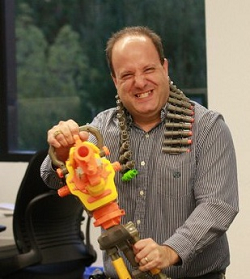Five9 last week announced the appointment of Jonathan Rosenberg as its new CTO and head of artificial intelligence (AI). Previously, Rosenberg was the CTO of Cisco’s Collaboration Technology Group, where he was active with the development of Spark, now Webex Teams. Rosenberg’s move to Five9 is not completely surprising, as it reunites him with Rowan Trollope, who moved from Cisco last May to become the CEO of Five9.
There are few executives in the industry as well-known as Jonathan Rosenberg. At Cisco he was highly visible at company and industry events. He has also been very active in standards efforts that have fueled industry transformation. He is most well known as the primary author of SIP, standardized as IETF RFC 3261 in 2002. Rosenberg has additionally been involved in the creation of many other seminal technologies, including WebRTC, SIMPLE, ICE, and IMS. He has held numerous leadership positions in the IETF, and with 70 RFCs, is the fourth most impactful author of Internet standards.
Prior to Cisco, he was Chief Technology Strategist for Skype. And before it was sold to Cisco, Rosenberg was CTO of earlier VoIP startup Dynamicsoft, which shipped many industry firsts, including the first SBC, IMS, presence server, SIP app server, and SIP proxy.
Rosenberg holds a Bachelor of Science degree and a Master of Science degree in electrical engineering from MIT, as well as a doctorate in electrical engineering from Columbia University.
I knew that Rosenberg intended to take a very thorough and methodological approach to his recent job search, so wanted to find out more about what led him to Five9. Like many UC veterans, he’s become excited about the contact center and the impact AI can have on the space. Here’s a portion of our conversation.
Your departure from Cisco was announced in September. Based on your relationship with Rowan Trollope, it wasn’t a big surprise that you ended up at Five9, but why did it take so long?
My search was really thoughtful, and it wasn't obvious to me at the beginning that I would end up at Five9. I talked with a lot of companies, and had many offers, before I ultimately ended up at Five9. What I did was this: I knew out of the gate that I wanted to go to a pure-play SaaS company. I also knew I wanted to stay in the collaboration industry. So, I made a list of the companies in this space which were well regarded, focusing mostly on mid-sized companies and larger. I listed consumer companies too, though I quickly found there wasn't as much going on, and so I really focused on B2B players. With that list built, I more or less reached out to the executive leadership at each of them to understand what the opportunities were, and whether there was a role for me. I probably spoke with 20 to 30 companies over the past three months!
The hardest part wasn't actually figuring out whether the company was good; it was finding out whether there was a good, meaty, and impactful role for me to fill -- one where there was a hard problem for me to solve. I quickly discovered that there was more for me to do at medium-to-large companies (vs. startups, where the CTO needs to be coding), and that my skills were better suited to B2B players and not consumer providers. I also needed to find places where the culture was good and would allow me to work remotely. And perhaps most importantly, that there was a boss I liked. In a lot of ways, in a job search, you are hiring your boss.
So, when I put it all together, it was about a culture I liked and could be effective in, combined with a role where I had big problems to solve and they really needed someone like me, and a solid company with a good set of products and industry reputation of which I could be proud.
In your new role, you will be responsible for AI. What is your interest and background in AI?
My background -- like everyone’s really -- is relatively recent, since the tech did not exist prior to around five years ago. At Cisco, I oversaw our AI efforts, and my team and I were instrumental in developing the strategy for the Collaboration group. This ultimately resulted in the acquisition of MindMeld and the creation of the Webex assistant. I also ran a small machine learning (ML) team, which did model development, and oversaw several prototypes. The most successful was the Webex noise reduction feature. I also built a training program for the engineering team, and we trained around a thousand engineers in ML. I myself took some of that training.
For me, when people say AI, I translate that to ML. My interest is in machine learning, which is, at the core, a new technique for building a large class of algorithms. It represents the most significant advance in computer science in the last 25 years, probably on-par with the invention of object-oriented design, or maybe even bigger than that. As a result, my view is that anyone who is working in computer technology, and designing complex systems that perform decision processing, need to be aware of ML and AI.
Of course, where ML has really shined is in speech recognition and natural language processing, where these new techniques have dramatically improved the state of the art. They’ve now made the technology good enough to more broadly apply it to human speech, and that, to me, is really exciting. If you think about it, up till now, the goal of most of the products in the collaboration industry is to ”make a connection” -- to get audio and video correctly shared across people and devices. Basically, it’s been about moving the bits from point A to B, but not really processing the semantics of the bits. We’re now able to process the semantics of those bits, and this is going to create an entirely new era of collaboration tools.
Besides the job search, did you use your break to do anything else?
The job search, which included a lot of general networking and relationship building, actually took the vast majority of my time. I had many meetings each day, traveled multiple times. In many ways, it was almost like I was still working. It did start to ramp down toward the end, and so that gave a bit of free time.
I’m a big believer in continuous learning, and so I did a bunch of online learning, particularly focused on natural language processing as time started to become available.
I also spent a bunch of time pursuing my personal goal of watching/re-watching all of Star Trek: The Next Generation, followed by Deep Space Nine. I finished all of TNG, and got about half way through DS9, before starting my new role.
And of course, I spent time with family and friends.
In previous roles, you have expressed concern about the state of cloud security. Are those concerns compatible or in conflict with your work at Five9?
Absolutely! Security -- and these days especially, privacy -- need to be top of mind for any technology leader doing SaaS, and they will continue to be so for me. Indeed, three days in to my new role, and I’ve already been involved in some security discussions on how we can make things better. I plan on being a significant advocate for security at Five9 and look for ways in which there are innovative security and privacy technologies that can differentiate Five9 from the competition.
The contact center market is very crowded, with some very innovative vendors. Why do you think Five9 will win?
The company is doing extremely well; it's already winning. Its revenues and revenue growth are just amazing, and it is one of only two players in the upper right Garter MQ for CCaaS. So really, the question is why wouldn’t they continue to win?
That said, you are of course correct that there are recent entrants which are challenging things. Amazon and Twilio are clearly the ones that everyone is watching. Their products are both in their infancy, so it remains to be seen whether their takes on these products gain market traction.
Part of why I’m here is to dramatically accelerate the innovation pipeline at Five9, to make sure we continue the market share leadership we’ve already established.
At Cisco, you had some contact center responsibilities, but it wasn’t your core focus. Is your lack of direct experience in the contact center an asset or liability?
I think the fact that I haven't been a “contact center person” -- namely, someone who has focused exclusively on contact center -- is an asset. This is a technology that has room for massive innovation right now. As an end user who calls into a contact center, do you feel like your experiences are generally amazing? Probably not, to be honest. Do contact center agents feel like they have amazing experiences with the tools they have? Well, maybe some do, but in general, I also think they’d say it’s just OK. With the transition to the cloud, we can revolutionize these experiences and make them so much better for everyone -- for the end user, for the agent, for the supervisor. The only way to do that is with somewhat fresh eyes that challenge old assumptions.
I know you wanted to work in a company with a disruptive opportunity. Tell me how Five9 met that test.
The cloud is an enabler of disruption, and the pure-cloud players will be doing the disrupting. Within the collaboration market, contact center is the least far along in its transition to the cloud. This means there is still a lot of room for innovation and disruption. Contact center is also the place where the use cases for ML are clearest, and where useful data already exists which can improve outcomes. So, the ideal place for disruption is a cloud-based company, doing contact center, with no premises infrastructure, large enough to have enough data to do some interesting things, and enough customers to make a difference in the industry as a whole. When I looked at it through that lens, Five9 was almost the only choice for me.
Besides learning to use Slack, what are some areas that require some focused learning in order to be successful in this new role?
Continued learning in machine learning, AI, and natural language processing is key for me. I plan on continuing to take classes, read materials, and, in general, increase the depth of my expertise in this space. And of course, getting much deeper industry knowledge on contact center than I have today.
Dave Michels is a Contributing Editor and analyst at TalkingPointz.










